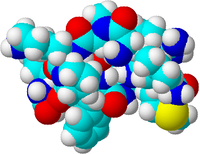
Photo from wikipedia
Human polyomaviruses, such as JCPyV and BKPyV, cause significant morbidity and mortality in immunocompromised or immunomodulated patients. There are no treatments for polyomavirus-induced diseases other than restoration of immune function.… Click to show full abstract
Human polyomaviruses, such as JCPyV and BKPyV, cause significant morbidity and mortality in immunocompromised or immunomodulated patients. There are no treatments for polyomavirus-induced diseases other than restoration of immune function. We discovered that the oxindole GW-5074 potently inhibits infection by both JCPyV and BKPyV. Further optimization of this compound could result in the development of antiviral therapies for polyomavirus-induced diseases. ABSTRACT JC polyomavirus (JCPyV) is a ubiquitous, double-stranded DNA virus that causes the fatal demyelinating disease progressive multifocal leukoencephalopathy (PML) in immunocompromised patients. Current treatments for PML are limited to immune reconstitution, and no effective antivirals exist. In this report, we show that the oxindole GW-5074 (3-(3,5-dibromo-4-hydroxybenzylidene)-5-iodoindolin-2-one) reduces JCPyV infection in primary and immortalized cells. This compound potently inhibits virus spread, which suggests that it could control infection in PML patients. We demonstrate that GW-5074 inhibits endogenous ERK phosphorylation, and that JCPyV infection in GW-5074-treated cells cannot be rescued with ERK agonists, which indicates that the antiviral mechanism may involve its antagonistic effects on MAPK-ERK signaling. Importantly, GW-5074 exceeds thresholds of common pharmacological parameters that identify promising compounds for further development. This MAPK-ERK antagonist warrants further investigation as a potential treatment for PML. IMPORTANCE Human polyomaviruses, such as JCPyV and BKPyV, cause significant morbidity and mortality in immunocompromised or immunomodulated patients. There are no treatments for polyomavirus-induced diseases other than restoration of immune function. We discovered that the oxindole GW-5074 potently inhibits infection by both JCPyV and BKPyV. Further optimization of this compound could result in the development of antiviral therapies for polyomavirus-induced diseases.
Journal Title: mBio
Year Published: 2023
Link to full text (if available)
Share on Social Media: Sign Up to like & get
recommendations!